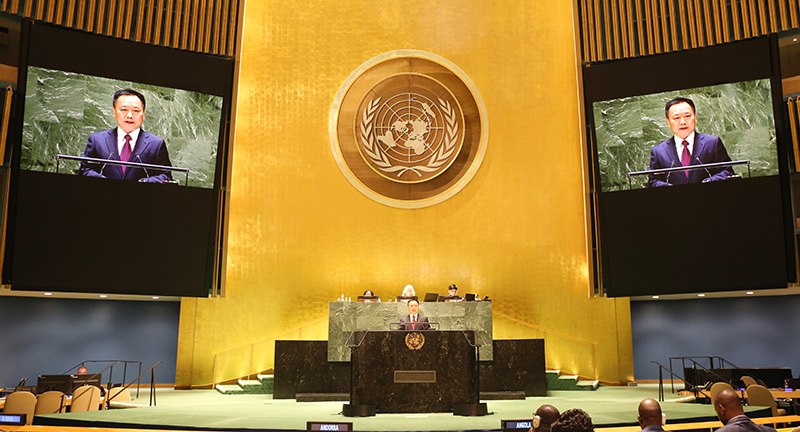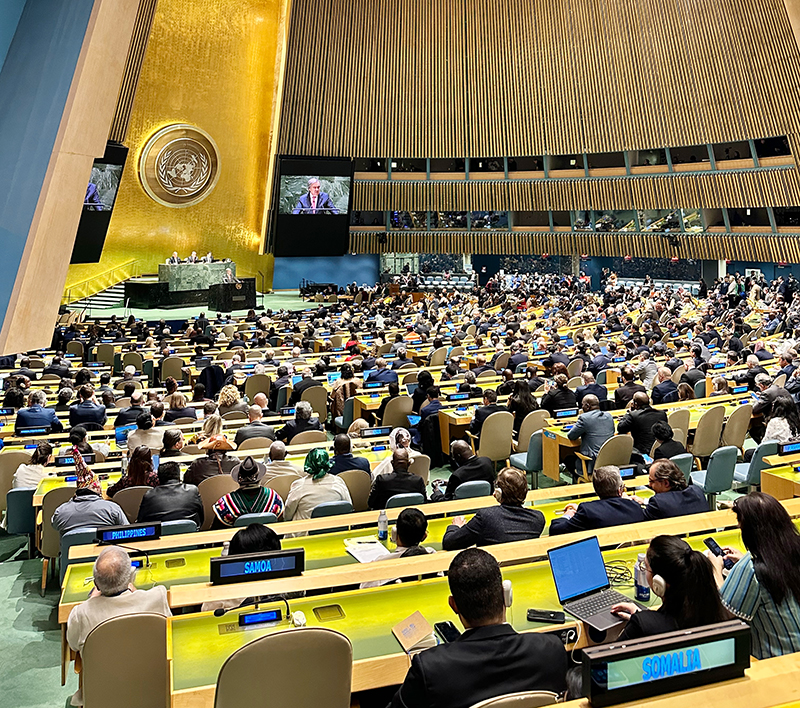
On March 22, the UN Water Conference was convened at the UN Headquarters in New York, USA. H.E. Mr. Li Guoying, Minister of Water Resources, led a Chinese water delegation to attend its opening ceremony and delivered a general debate speech at the plenary session.
Minister Li pointed that China adheres to the new development concept of “innovation, coordination, green, opening up and sharing”, and practices President Xi Jinping’s water governance philosophy of “prioritizing water conservation, balancing spatial distribution, taking systematic approaches, and giving full play to the roles of both government and market”. China has made significant progress in achieving water-related goals of the UN 2030 Agenda for Sustainable Development. Firstly, China has promoted integrated water supply for urban and rural areas, upgraded the scale of centralised water supply and enhanced the standard development of small-scale projects in accordance with local conditions. The rural water supply projects have covered all rural population, and 87% of rural residents have gained access to tap water. China has accelerated the construction of the national water network. The national water supply capacity of water projects has reached 890 billion cubic meters, which can effectively defend water crisis in a year of major drought. Secondly, the National Water Saving Action Plan has been fully implemented. In 2022, the water consumption per 10,000 RMB of GDP and per 10,000 RMB of industrial added value decreased by 33.4% and 50.3% respectively compared to 2015. With 6% of the world’s fresh water resources, China has provided water for nearly 20% of the world’s population, and created more than 18% of the world’s total economic output. Thirdly, China has implemented the river and lake chief system nationwide. 1.2 million river and lake chiefs have taken up their duties. With every river and lake under care, more and more rivers and lakes have regained life and vitality. Fourthly, China has been actively promoting international exchange and cooperation, and continuously supporting developing countries to enhance their water governance capacity.
Based on China’s practice and experience in implementing water-related goals of the UN 2030 Agenda for Sustainable Development, Minister Li put forward the following four initiatives. Firstly, everyone has the basic right to safe drinking water, while in most cases, access to this right is far beyond the reach of individual efforts, especially for people living in poverty, drought and remote areas. Thus, governments, civil societies and the entire international community shall provide support and assistance to guarantee everyone’s equitable access to this basic right. Secondly, it is imperative to fully understand that freshwater resources are limited and there is no substitute. Therefore, sustainable use of freshwater resources is a common obligation and responsibility of everyone in the global village. Economical and intensive use of water resources shall be comprehensively pushed forward, by means of raising agricultural water use efficiency, reducing industrial waste water emission and decreasing water leakage and loss in urban areas. Thirdly, it is necessary to respect the fundamental right of rivers to survive in nature, treat water as living entities, develop river ethics, protect river’s healthy life and achieve a harmonious coexistence between human and river. Fourthly, in the face of the grave challenge of global climate change and its intensifying impact, the role of UN agencies shall be brought into full play in rendering an exchange and cooperation platform for governments, international organizations, think tanks, civil societies and other stakeholders, which have respective strengths in responding to global climate change, so as to pool wisdom and strength to tackle challenges regarding water disasters, water resources, water environment and water ecology.
Minister Li noted that led by President Xi Jinping’s Global Development Initiative and Global Security Initiative, China stands ready to work with the international community and make more new contributions to achieving water-related goals of the UN 2030 Agenda for Sustainable Development, so as to jointly draft a new chapter on water governance in promoting a community of shared future.
The UN Water Conference is the highest and most influential water related meeting held by the United Nations in the past 50 years, which has aroused widespread attentions and strong repercussions worldwide. About 6,000 people from more than 200 countries and international organizations participated in the conference. 194 national leaders, ministers in charge of water resources and representatives of intergovernmental organizations and non-governmental institutions addressed in the conference. Six plenary meetings, five interactive dialogues and more than 200 side events will be convened during the conference, comprehensively reviewing the mid-term implementation of the UN International Decade of Action on “Water for Sustainable Development”. The conference will gather global political consensus and adopt the “Water Action Agenda” to accelerate the realization of water-related goals of the UN 2030 Agenda for Sustainable Development.
